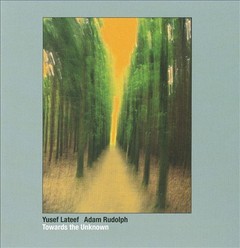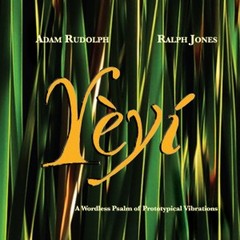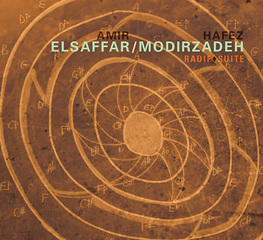Yusef Lateef & Adam Rudolph, "Towards the Unknown" (Meta/YAL)
The blues is in ya, so whether you travel to the jungle or the ghetto or 1920 Vienna, the blues will come along (sometimes in disguise).
The first half of this record nominally belongs to percussionist-composer Adam Rudolph, but his partnership with jazzmaster Yusef Lateef goes back decades, so it's natural that Dr. Lateef sets the tone -- singing about catching that Delta train as a gnawan bass thwacks along and the Organic Orchestra's eerie strings gush forth. Then Lateef packs the blues in his urban tenor while Rudolph establishes deep African rhythm on hand drums. Further along, rainforests drip; light streams through the trees; birds call out a warning of dramatic tension. A flute, a bell, a drone. Is this something very new or very old? Both.
Lateef's half of the album switches orchestras for a modern dawning, a folding and a moaning. The strings stab soft. Rudolph's persistent hand drums jam intensely, inspiring a wondrous dialogue in the second/final movement. The two musicians stand as brothers in arms, mustering a vibrational incursion of love and knowledge, conversing in semi-engaged dissonance, finally swaying together till they fade like a last breath.
So that is the way transformation does its work.
Adam Rudolph & Ralph Jones, "Yèyí" (Meta)
A couple of old friends jam nonstop on an African vibe. Since each plays a roomful of instruments, the colors are always changing: In the first segment alone, you get a low drum underboil, vocal expostulations, cymbal scrapes, flute caresses, shocking reed interjections, bells, chimes, sounds you might not even recognize, and there's enough space that each one makes a pronounced impact. Good for dreamy zone-outs, but the level of activity also makes it a great background for working. That is, if you've got one of those things -- what's it called? -- a job.
Amir ElSaffar & Hafez Modirzadeh, "Radif Suite" (Pi)
This record can hit you on a number of levels.
Most obvious is the way Hafez Modirzadeh taps the quartet dynamic of early Ornette Coleman (who's thanked in the notes). The lineup is ideal for this: Mr. M's dusky tenor sax plus the malleable trumpet of Amir ElSaffar, the bass of technical superimagineer Mark Dresser and the drums/percussion of the always transcendent Alex Cline. All have the Ornette tradition in their blood, but each adds a dimension -- Modirzadeh's earthy poetry, ElSaffar's Arabisms, Dresser's distinct rhythmic/harmonic amplification, Cline's whisking grooves and Tarkovskyan cymbal galactics. They contemplate, they groove, they scramble, they overlap and unite; it's like 1961 but with worldwide ears.
That's the first half. In the second, ElSaffar's "Copper Suite" highlights his ongoing synthesis of jazz and the Iraqi maqam tradition. (Read my review of his 2007 "Two Rivers" here.) This involves employing some notes outside the standard Western scale, but his meld is so artful that you hardly notice the additions, except when he throws 'em into relief by presenting the relationships as shivering microtonal harmonies, as in the suite's introduction. (It's a statement; polyphony is not indigenous to most Eastern music.) A touch of Coltrane here, a touch of Ayler there, but personal. If I'm making the concept sound too technical, f*ck me, cuz it's beautiful and often swinging.
What the two leaders accomplish here is no jam: It was a disciplined project where they not only plumbed the commonalities of jazz, Iraqi and Persian forms, but conceived their work in political terms. So the semitones represent what internationally rooted ethnomusicologist Modirzadeh calls a "dis-integrative" break with "colonized temperaments," through which the musicians can present themselves as "fully human." At one time that might've sounded like militant rhetoric; in the context of this music and today's enslaved world, it's a message for everyone, enhanced by a mood of mystical connection, breath and peace.
The result could be freedom, which, from what I hear, is something we all desire.



